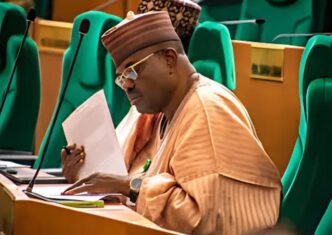HB.879-A Bill for an Act to Amend the National Teachers’ Institute Act, Cap. N79, Laws of the Federation of Nigeria, 2004 for the Institute to Constitute the Membership of the Council and provide Nigeria Certificate in Education, Undergraduate, Post Graduate and Research Programs in Teachers Education and for Related Matters. Bill Sponsored by Hon. Julius Ihonvbere. Bill Progress: Third Reading.
In a significant development for Nigeria’s educational landscape, a new bill has been proposed to transform the National Teachers’ Institute (NTI) into a recognized degree-awarding institution. Sponsored by Hon. Julius Ihonvbere of the Owan Federal Constituency, the bill, numbered HB.879, aims to amend the current National Teachers’ Institute Act, initially established in 1978 and last revised in 2004. While the existing framework mandates the NTI to mainly provide distance learning, training, and certification for teachers, the proposed amendment would considerably expand its educational mandate, allowing it to award its own degrees.
The proposed amendments seek foundational changes that could reshape the NTI’s role in teacher education across Nigeria. One of the key changes includes establishing a degree-awarding status for the NTI, enabling the institution to offer a broader range of academic programs, such as the Nigeria Certificate in Education (NCE), undergraduate, and even postgraduate courses. By granting the NTI the authority to confer degrees, the bill envisions a shift in its operational dynamics, positioning it alongside traditional universities and colleges of education within the higher education framework.
Additionally, the amendment seeks to enhance the NTI’s capabilities by expanding its research functions. This formalization of the research aspect within the realm of teachers’ education is crucial, as it recognizes the importance of research in informing teaching practices and enhancing educational outcomes. Previously limited, the bill’s provisions would allow the NTI to engage in meaningful research activities that can contribute to the development of innovative teaching methodologies and educational policies.
An important aspect of the bill is the proposed restructuring of the governing Council of the NTI. By revising the membership and composition of the Council, the amendment reflects the expanded responsibilities and aims of the Institute. This restructuring is a typical feature in legislative adjustments, ensuring that the governance of the institution aligns with its new objectives and the essential oversight required for its advancement.
At this point, it is crucial to consider the legislative context surrounding the proposed bill. Hon. Julius Ihonvbere, known for his commitment to educational reform, brings significant attention to the importance of improving the nation’s educational framework. As per the latest updates, HB.879 had its First Reading in the House of Representatives, marking the initial stage of the legislative process. In this stage, the bill was formally introduced, but it still requires a Second Reading and subsequent public hearings to advance through the legislative agenda.
The implications of this bill extend beyond the scope of the NTI itself, as it indicates a broader trend within Nigeria’s National Assembly to create new tertiary institutions and upgrade existing entities. The motivations behind empowering the NTI to award academic degrees appear multifaceted. Primarily, there is a collective aim to enhance the quality of teacher training and professional development. By allowing the NTI to offer a comprehensive range of programs, the bill seeks to elevate the standards of teacher education, addressing concerns about the quality and preparedness of educators within the Nigerian educational system.
Moreover, upgrading the NTI’s status aligns with the ongoing efforts to increase access to higher education across Nigeria. With the growing demand for qualified teachers to meet the country’s educational needs, expanding the NTI’s capacity will provide additional opportunities for individuals seeking to enter the field of education. This accessibility can be particularly beneficial for those who may not have the option to attend traditional universities, especially in underserved areas.
However, such significant institutional changes are not without their challenges. A primary concern revolves around the financial investment required to establish the necessary infrastructure, libraries, laboratories, and facilities that a degree-awarding institution demands. Transitioning from a distance education model to a more comprehensive education system necessitates substantial resources to ensure that academic standards are met.
Additionally, the bill must navigate the regulatory frameworks established by other higher education bodies in Nigeria. Ensuring compliance with the standards set forth by entities such as the National Universities Commission (NUC) will be critical to maintain academic quality and credibility as the NTI evolves into a degree-awarding institution.
Another potential challenge is the risk of overlapping mandates or conflicts with existing universities and colleges of education. As the NTI aims to expand its educational offerings, it is essential to delineate its role clearly within the greater higher education landscape to prevent redundancy and inefficiencies in teacher training.
In conclusion, the proposed bill to transform the National Teachers’ Institute marks a pivotal step in Nigeria’s educational reform efforts. With the ability to award degrees, the NTI could significantly improve teacher training, expand access to higher education, and ultimately contribute to addressing the country’s teacher shortage. However, it will require careful consideration of the associated challenges, including funding, regulatory compliance, and collaboration with existing educational institutions. The success of this endeavor will hinge on a collective commitment to enhancing the quality of education in Nigeria and ensuring that future generations of educators are adequately trained and supported. As HB.879 continues through the legislative process, its potential impact on the nation’s educational fabric remains a topic of significant interest and importance.












